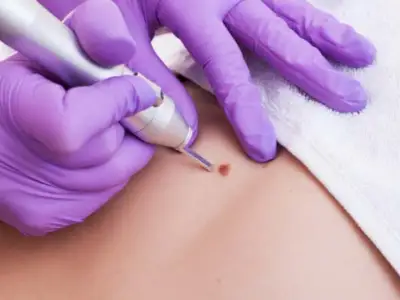Genital Warts HPV Vaccine
Genital warts are among the most common sexually transmitted diseases. The disease occurs after contact with the Human Papillomavirus (HPV). The lesions typically start within 2-3 weeks after exposure. In some cases, lesions may appear later depending on the immune system's condition. They can appear as painless cauliflower-like growths or flat bumps on the skin. Since they usually do not produce symptoms, patients often come to us after the condition has spread.
To date, approximately 200 types of HPV have been identified. However, only certain strains cause cervical cancer (cervix carcinoma). Therefore, we can say that not every genital wart leads to cervical cancer. Nonetheless, I recommend a gynecological examination and Pap smear test for every patient. This way, we conduct a cervix HPV test for all our patients in whom we detect HPV, either in themselves or in their partners.
How is HPV transmitted?
The most common route of HPV transmission is through contact with lesions on the skin. Wart lesions can be seen on the hands, face, arms, legs, soles of the feet, and genital areas, meaning they can appear anywhere on the skin. This indicates that transmission can rarely occur in pools, saunas, or shared toilets. Additionally, we often see cases where a mother's wart can transmit to her child. However, as I mentioned, the most common types of HPV that cause cancer are types 6, 11, 16, 18, 31, 33, 45, 52, and 58. Vaccines have been developed to include these strains. There is no need for HPV typing in lesions outside the genital area.
What are the HPV vaccines?
In our country, there are two types of HPV vaccines available. Cervarix contains HPV types 16 and 18. Gardasil 4 protects against HPV types 6, 11, 16, and 18. The newly released Gardasil 9 provides protection against HPV types 6, 11, 16, 18, 31, 33, 45, 52, and 58. The most comprehensive vaccine is the latest one.
Who should receive the HPV vaccine?
The goal of vaccination is to protect individuals who have not yet been exposed. Therefore, vaccination should be administered to boys and girls starting from age 9. For ages 9-14, 2 doses spaced 6 months apart are sufficient; for ages 15-25, the vaccination schedule is 0-2-6 months for Gardasil, and 0-1-6 months for Cervarix. The vaccine contains virus-like particles that prepare the immune system. It is not a live vaccine, so it does not cause disease.
Who should not receive the HPV vaccine?
The vaccine is not administered during pregnancy or to individuals with yeast allergies. It is also not recommended for individuals over 45 years old.
In summary, HPV infections are significant virus types that can lead to cervical cancer, penile cancer, oral cavity cancer, anal cancers, and head and neck cancers. Being able to protect oneself with the vaccine is valuable. Please do not neglect to vaccinate your children and yourself in a timely manner.
Our clinic offers HPV typing tests and HPV vaccinations.
For more detailed information, you can reach us at our phone numbers: 0554 790 78 97 – 0242 505 68 14





